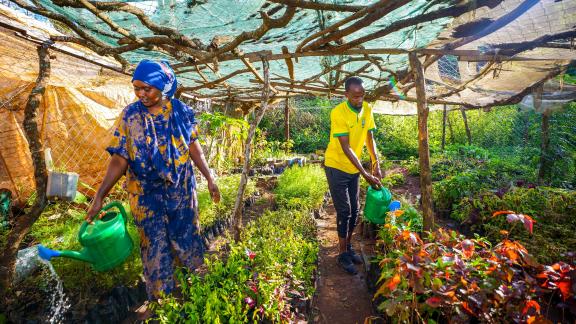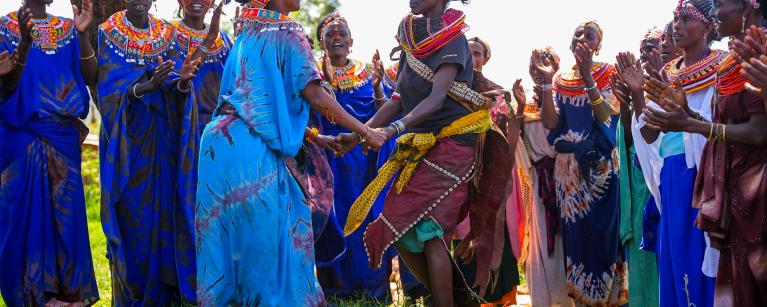Entrenched retrogressive cultural norms have perpetuated harmful practices such as Female Genital Mutilation (FGM), child marriage, and Gender-Based Violence (GBV), further compounding the challenges faced by women and girls in Marsabit. According to Godana Wario, the Community Resource Person at MWADO, at least 15 GBV cases are reported at their office in a month.
Asili Boru, 42, is a single mother of five children. She lives in Marsabit town with her children after her husband divorced her. She was 21 years old when she got married.
Asili Boru, 42, is a single mother of five children. She lives in Marsabit town with her children after her husband divorced her. She was 21 years old when she got married.
“The issue I had with my husband was that he was not providing for the family. I brought the case to the elders, but they too could not help me. This continued for a while, and I suffered a lot. He left me and went to marry someone else. My children were too young. I was left without anything. I went through so many challenges just to raise my children, Asili shares, her voice heavy with emotion.I used to wash clothes for people and that is how I was able to provide for my children. Now, two have finished high school, one is in college another is in secondary school and my last born is in primary school”, she continues.
In April 2024, Asili and 14 other survivors formed a group under the guidance of MWADO. The 15 women each received KSh.20,000 to enable them to invest in economic activities of their choice, to provide for themselves and their children.
Asili decided to start a groceries business in the same month of April and eight months later, she is proud of the work she does and even more glad that she does not struggle so much to provide for her children.
“When I was given the money, I paid KSh. 5,000 for rent, bought stock with the remaining amount and began a grocery shop. Later on, I started a chips business. I have been saving my profit since April 2024 and that is how I have managed to even pay school fees for my children”.
The cash grant was more than just financial assistance for Asili and other women who received it – it was a lifeline that reignited their hope and gave them a renewed sense of possibility for the days to come.
“On behalf of other women who have received support from MWADO and Oxfam, I am grateful. We have been uplifted”, says Asili, her smile soft but full of joy.
Further up the road from where Asili lives and works, is a farm, owned and managed by Links Youth Group, who also received a cash grant of KSh.241,000. This group is 10 members-strong and is led by 30-year-old Guyo Galgallo who attests to the benefit and strength they have found in uplifting each other through working together and selling their farm produce.
In Marsabit, many young people who are unable to find work have turned to drug abuse, while some girls are married off early, and those who have the means, often move to cities across the country in search of better opportunities.
The members of Links Youth Group have also experienced these challenges and coming together was their way of finding a solution.
“We received KSh. 241,000 from MWADO and it has helped us so much. We did not have a fence for our farm, so we put up one, complete with a gate that has our name on it, we put together a greenhouse which has helped in keeping away the monkeys that would come to destroy our crops, built a store, and employed someone to look after our farm at night. We have two water tanks, 5000 litres each which we use when the water levels reduce in the stream.”
The group has a paybill number where all the sales are deposited. They grow kale and spinach, cultivate various tree species, harvest, and sell honey from their beehives and engage in poultry farming. At the end of each year, they gather to review their accounts and distribute the profits among themselves.
“We received KSh. 241,000 from MWADO and it has helped us so much. We did not have a fence for our farm, so we put up one, complete with a gate that has our name on it, we put together a greenhouse which has helped in keeping away the monkeys that would come to destroy our crops, built a store, and employed someone to look after our farm at night. We have two water tanks, 5000 litres each which we use when the water levels reduce in the stream.”

Guyo Galgallo (wearing a yellow jersey) the Link Youth Group Chairman alongside a member, watering their seedlings at the group's greenhouse. Photo by Shariff Abdi/Oxfam.
Together with providing cash grants, MWADO conducted training sessions on financial literacy, sustainable crops and livestock, entrepreneurship, and sensitized the project participants on the effects of FGM and child marriage.
“We have been taught a lot, even though most of us cannot read or write. We have received different trainings about FGM and how we are not supposed to allow our girls to go through it or be married off early. We have been taught about the rights of women and children and about good agricultural practices, ” reiterates Habiba Jillo, a member of Qarqab Women group in Badasa haro.
The stories of Asili and Links Youth Group reflect the transformative power of opportunity. The cash grants did not just rebuild livelihoods – they restored hope. In a region burdened with challenges, young people and survivors are proving that given the right support, they can rise, inspire, and lead their communities towards a better future.
